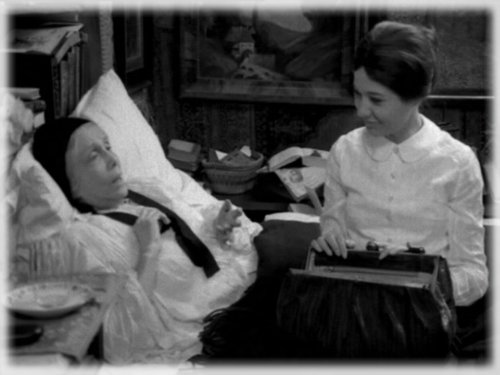 Karoly Makk is considered one of the best post-war Hungarian directors, and is certainly one of the best cinematic commentators of the Communist experience in Eastern Europe. ‘Szerelem’ (translated as ‘Love’) is his best received film, and finally gets a Western release thanks to the sterling work of Second Run, who are steadily carving out a niche for themselves as distributors of great, unknown films from largely ignored national cinemas. Based on two short stories written by Tibor Dery, Makk’s film nominally focuses on the love a wife (Luca) and a mother have for a man (Janos) whom we never see until the final quarter of the film, and the relationship between the two women.
Karoly Makk is considered one of the best post-war Hungarian directors, and is certainly one of the best cinematic commentators of the Communist experience in Eastern Europe. ‘Szerelem’ (translated as ‘Love’) is his best received film, and finally gets a Western release thanks to the sterling work of Second Run, who are steadily carving out a niche for themselves as distributors of great, unknown films from largely ignored national cinemas. Based on two short stories written by Tibor Dery, Makk’s film nominally focuses on the love a wife (Luca) and a mother have for a man (Janos) whom we never see until the final quarter of the film, and the relationship between the two women.‘Szerelem’ is set in 1953, when Hungary was under the totalitarian rule of Mátyás Rákosi during which thousands of real and imagined foes were killed or arrested. Janos has been arrested on an unknown, but presumed fictitious charge, and is serving a nine year sentence. Luca is not permitted to see her husband and knows not whether he is alive, let alone in good physical health. Janos’ mother is looked after by Luca and a housekeeper. A seriously ill, bed-ridden woman, she does not know what has happened to her son. Since she does not have long to live, and that the shock of Janos’ arrest might kill her, Luca constructs a web of deceit, writing letters supposedly from Janos that tell of his great success as a film director in the United States. These are very elaborate letters, written in great detail, that even the housekeeper claims are beyond the realm of probability. So why doesn’t Janos’ mother suspect that not all is as it seems to be? Luca tells the housekeeper that she is ‘deaf and blind’ when it comes to Janos. Such is her love for her son that she will believe any news of his supposed success.
However, there is one idea that she wants to believe what Luca’s letters present, and gives the impression to believes it wholesale, but that she has some idea of the truth. Much of the narrative is composed of the memories and thoughts of Janos’ mother. When reading the prose of the letters Lucas has written, Makk visually presents her thoughts and intrerpretations. When she talks to Luca about her past, this is presented through a series of flashbacks. In one instance of reading a latter, Makk presents a series of random thoughts, but these are interspersed with flashes of the prison cell that we later see Janos has been imprisoned in. Therefore, should we determine that the inclusion of these shots suggests that Janos’ mother suspects what he really happened to him, and that she is deluding herself somewhat when Luca paints a picture of his success abroad?
Aware of her impending death, the mother tells Luca she has to see Janos again, possibly a tactic designed to confront Luca and force the truth out of her, though the mother backs down with this request when Luca says he would have to leave the film he is currently working on. She never gets her wish however, as she contracts pneumonia and only survives a few days after it’s diagnosed. As soon as he passes, Janos is released from prison, and Makk then shifts focus to Janos’ own feelings of disorientation and uncertainty. During his spell in prison, much has changed and he finds difficulty in coping and returning to a home he has not been part of, and a wife he has barely seen in the last several years. However, their love binds them together and sustains their marriage (which we assume, considering Makk has directed a sequel of sorts ‘A Long Weekend in Pest and Buda’ (2003) and also with their mutual declaration of an undying love).
For a film that is set during the most dangerous point in recent Hungarian history, and focuses on a man’s false imprisonment, Makk’s film is surprisingly lacking in political insight and bite. We don’t find out what Janos was arrested for, and the sole government officials we see are those overseeing his release, and possibly two men who claim to be from the telephone exchange. This is deliberate of course; partly because it was still filmed under Communism (albeit an era that had moved on from the terror of the Rákosi regime), but also because Makk obviously wishes to concentrate on the personal aspect; how living during these political conditions affects the everyday lives of people whose domestic bliss is shattered by them. It’s an approach that works for the better and remains free of simple moralising and judgement. A masterpiece by any yardstick.
1 comment:
Further to Kevin Wilson's comment that "A Long Weekend in Pest and Buda" is a "sequel of sorts" to "Love", the essay by John Cunningham and the interview with Mark Vlessing usefully supplied with Second Run's release of the later film as a DVD make it quite clear that the relationship between these two films is more complex. In fact, the titles sum up perfectly the difference in both tone and values between these two films.
Post a Comment